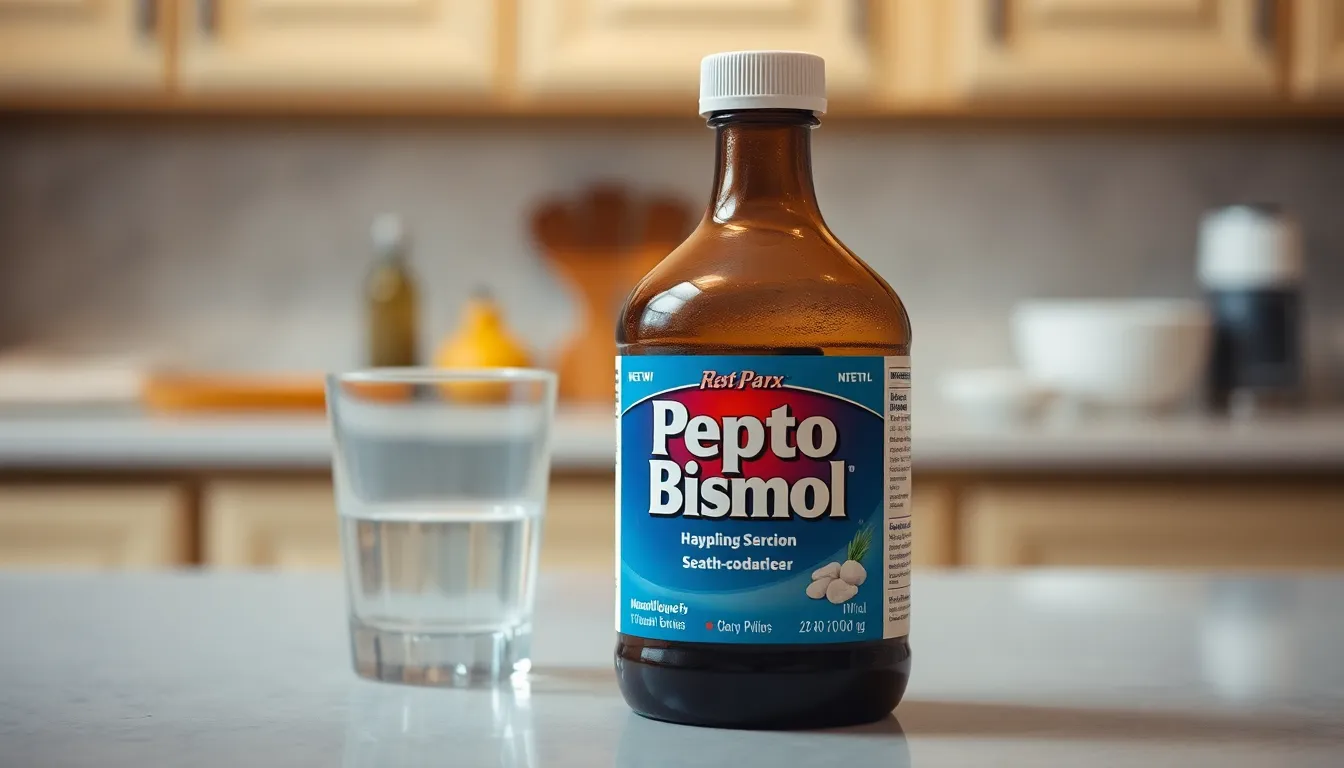Table of Contents
ToggleWhen nausea strikes, it can feel like a rollercoaster ride with no end in sight. Enter Pepto Bismol, the pink wonder that promises relief from that stomach turmoil. But does this bubbly concoction really pack the punch it claims?
Imagine a world where your stomach doesn’t feel like it’s auditioning for a horror movie. Pepto Bismol might just be the hero you didn’t know you needed, swooping in to save the day. With its quirky color and catchy jingle, it’s hard not to wonder if it’s more than just a pretty face.
Overview of Nausea
Nausea represents a common symptom that many individuals experience. Various triggers contribute to its onset, including motion sickness, digestive disorders, and certain medications. The sensation often leads to an uncomfortable urge to vomit.
Gastrointestinal issues frequently cause nausea. Conditions like gastroenteritis and acid reflux significantly impact the stomach lining, leading to discomfort. Stress and anxiety can also initiate nausea, affecting individuals’ emotional and physical states.
Symptoms of nausea typically accompany other issues. Vomiting may occur alongside dizziness and sweating, which intensify discomfort. These symptoms vary in severity, impacting daily life and activities.
Treatments for nausea range from over-the-counter remedies to prescription medications. Medications may target specific causes, providing targeted relief. Pepto Bismol offers another option, acting as an antacid and coating agent, potentially soothing an upset stomach.
Understanding nausea’s origins can help in choosing effective treatments. Identifying triggers plays a critical role in managing symptoms and preventing future occurrences. A proactive approach aids in achieving relief and improving overall well-being.
Understanding Pepto Bismol

Pepto Bismol acts as a potential remedy for nausea and stomach discomfort. This widely recognized medication contains active ingredients that contribute to its effectiveness.
Active Ingredients
Bismuth subsalicylate serves as the primary active ingredient in Pepto Bismol. This compound helps reduce inflammation in the stomach lining. Salicylate provides anti-inflammatory properties that can alleviate discomfort. Additionally, its ability to coat the stomach lining offers a protective barrier against irritants. Pepto Bismol also contains other ingredients that enhance its effectiveness, including simethicone, which helps relieve gas. Understanding these ingredients provides insight into how Pepto Bismol may help with nausea.
How It Works
Pepto Bismol works by addressing multiple symptoms associated with nausea. First, the bismuth subsalicylate component coats the stomach and intestines, soothing irritation. It also neutralizes excess stomach acid, contributing to relief from discomfort. When nausea arises from infection or irritation, its anti-inflammatory effects help reduce inflammation in the stomach lining. This dual action can effectively address nausea accompanied by upset stomach or digestive issues. Recognizing these mechanisms clarifies how Pepto Bismol aids in managing symptoms.
Does Pepto Bismol Help with Nausea?
Pepto Bismol is suggested as a remedy for nausea, but its effectiveness often depends on the underlying cause of the symptom.
Evidence from Studies
Research shows that bismuth subsalicylate, the active ingredient in Pepto Bismol, can be effective in treating gastrointestinal discomfort. A study published in American Journal of Gastroenterology found that it significantly reduced symptoms associated with gastroenteritis. Another review highlighted its role in minimizing nausea brought on by acid reflux. While these studies support its efficacy, results may vary based on individual responses. Evidence indicates that Pepto Bismol can aid in symptom relief, particularly when nausea relates to digestive issues.
Expert Opinions
Experts generally consider Pepto Bismol safe for nausea linked to stomach and digestive problems. Clinicians often recommend it for cases involving upset stomach and diarrhea. Dr. Michael W. Apkon, a gastroenterologist, points out its benefits in coating the stomach lining, which helps mitigate irritation. Nevertheless, he emphasizes the importance of determining the root cause of nausea before self-treating. Additionally, pharmacists often suggest Pepto Bismol for mild symptoms rather than severe conditions requiring professional attention.
Other Uses of Pepto Bismol
Pepto Bismol serves multiple purposes beyond alleviating nausea. It acts as an antacid, providing relief from heartburn and indigestion. Many people find that it also reduces diarrhea, making it useful for gastrointestinal distress caused by infections or food sensitivities.
Bismuth subsalicylate, the active ingredient, has antimicrobial properties that combat some bacteria responsible for stomach upset. Research highlights its effectiveness in managing symptoms related to traveler’s diarrhea. This benefit is particularly relevant for travelers facing unfamiliar foods and environments.
In addition to treating nausea and diarrhea, Pepto Bismol addresses upset stomach symptoms such as bloating and gas. It offers a soothing effect by coating the stomach lining, which can provide a sense of calm during digestive discomfort.
Some patients use it for relief from menstrual cramps linked to digestive issues. This application showcases its versatility as a treatment option for various ailments.
Pepto Bismol is also available in liquid and tablet forms, making it convenient for different preferences. Many individuals appreciate the easy-to-swallow nature of tablets while others prefer liquid for faster action.
Overall, Pepto Bismol is a multifaceted remedy that can target multiple gastrointestinal concerns at once. Recognizing its additional uses empowers consumers to manage their digestive health more effectively.
Possible Side Effects and Considerations
Pepto Bismol, while effective for nausea relief, may also cause side effects. Common ones include temporary darkening of the tongue and stool. This discoloration usually isn’t harmful and resolves after discontinuing the medication.
Some individuals may experience constipation when using Pepto Bismol. Limiting doses can help mitigate this effect. Allergic reactions, though rare, can occur, leading to symptoms like hives, difficulty breathing, or swelling of the face and throat. If these symptoms arise, seeking immediate medical attention is crucial.
Interactions with other medications pose another consideration. Nonsteroidal anti-inflammatory drugs and certain anticoagulants can have their effects altered when taken with Pepto Bismol. Consulting a healthcare provider before combining medications ensures safety.
Dosage guidelines are important for effective use. Adults typically take 525 mg (two tablets or 30 mL of liquid) every 30 to 60 minutes, not exceeding eight doses within 24 hours. Children ages 12 and older can follow similar dosing, though parental guidance is essential.
Individuals with certain conditions should avoid Pepto Bismol. This includes those with a history of salicylate allergies, gastrointestinal bleeding, or severe dehydration. A healthcare professional’s advice is necessary to determine if Pepto Bismol is suitable.
Monitoring symptoms during use is vital. Persistent nausea, abdominal pain, or worsening symptoms call for discontinuation of the medication. Reassessing the underlying cause for nausea can help guide treatment decisions moving forward.
Pepto Bismol can be a helpful option for those experiencing nausea related to digestive issues. Its active ingredients work to coat the stomach and reduce inflammation, providing relief from discomfort. While it’s generally safe for mild symptoms, identifying the underlying cause of nausea is crucial for effective treatment.
For those dealing with more severe conditions, seeking professional medical advice is always recommended. With its versatility in addressing various digestive ailments, Pepto Bismol remains a popular choice for many. However, users should be aware of potential side effects and consult healthcare providers when necessary.







